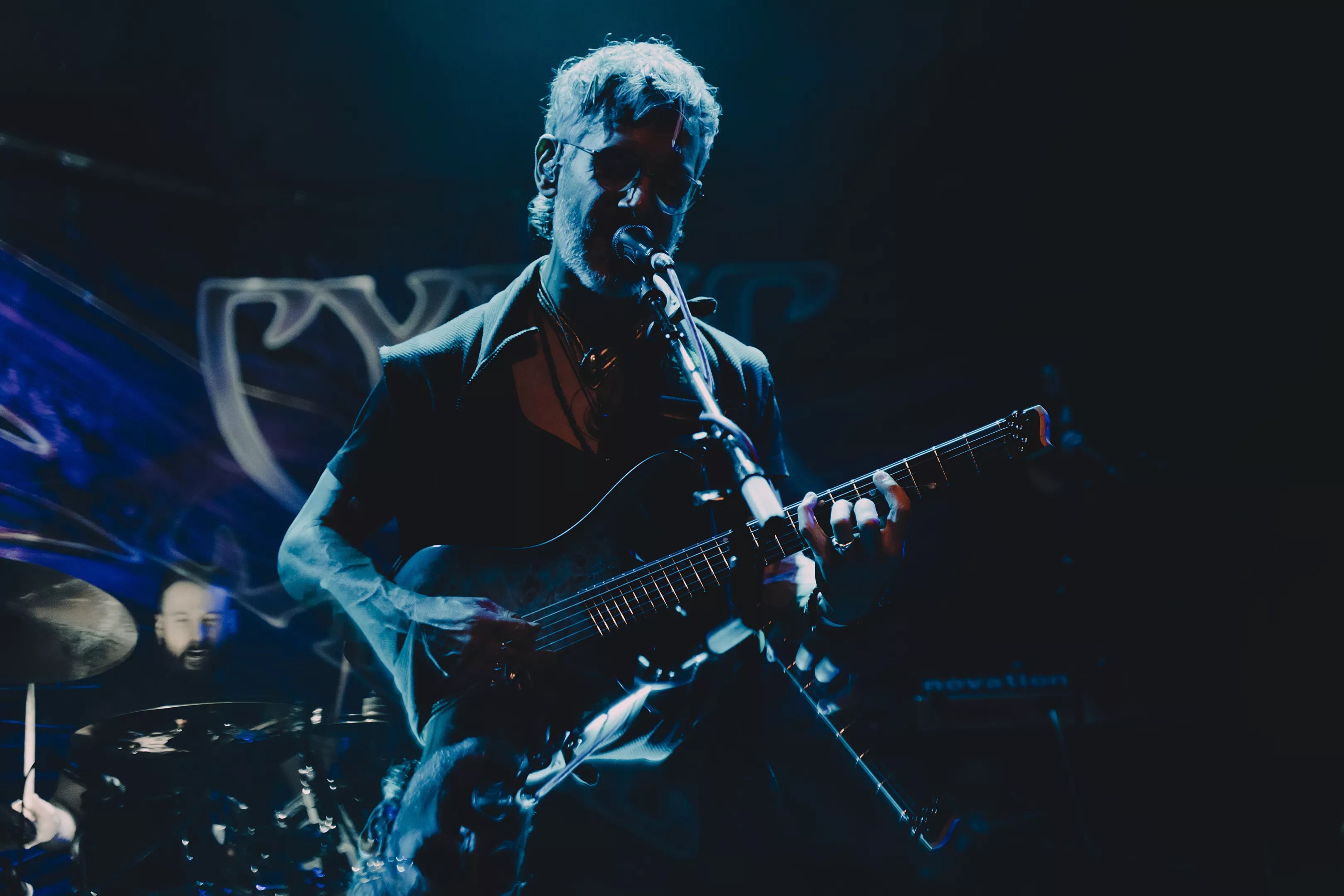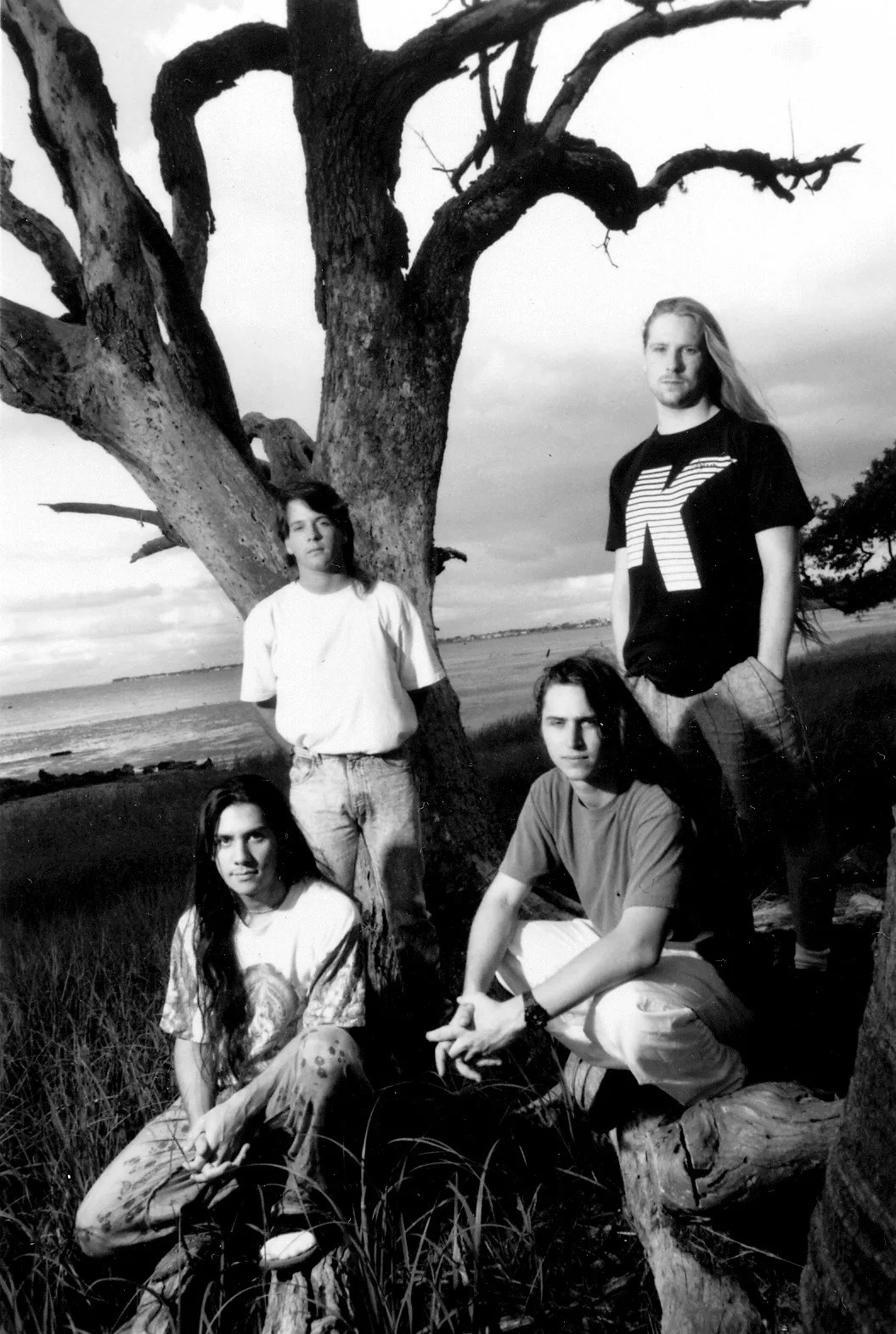
Photo by Stephanie Cabral

Audio By Carbonatix
Twenty-twenty was a terrible year for everyone, but it was particularly appalling for Paul Masvidal.
Just days before the World Health Organization declared COVID-19 an international public health emergency, he learned that Sean Reinert, his bandmate and cofounder of the legendary progressive metal band Cynic, had died suddenly and unexpectedly of heart failure. Only a few months later, Cynic would lose another beloved founding member when Sean Malone died by suicide.
Reinert was only 48 years old when he died. He was a once-in-a-generation talent, one of the world’s most influential and inimitable drummers. His astonishing technical virtuosity, coupled with Masvidal’s prodigious guitar chops, made the dynamic duo a game-changing force in extreme metal during the 1990s – first with the seminal band Death and later with Cynic.
Of course, describing Masvidal and Reinert as mere bandmates doesn’t even begin to cut it.
“I loved him. He was not only my best friend but also my creative partner,” Masvidal tells New Times. “I feel so lucky that we were able to spend over three decades making music together. Our musical relationship was truly something special. From the moment we first started jamming, we had an incredible trust in each other’s creativity. It was a karmic bond that went back lifetimes.”
They first became kindred spirits while in elementary school at Gulliver Academy. “It was evident from the beginning that we both had a strong passion for music and creativity, which brought us close,” Masvidal adds. “Music was our place of refuge. We used to jam at Sean’s mom’s place in South Miami, where he kept his drum set. We also played at my mom’s house and at [Jason Göbel’s, Cynic’s second guitarist]. When high school came, I went to boarding school for a couple of years while Sean stayed in Miami, but we stayed in touch by exchanging letters and discussing our dreams of forming a band again. When I returned, our plans for Cynic started to take shape.”
By then, Masvidal and Reinert were classically trained, obsessively driven instrumentalists with expansive scholarly interests in jazz, experimental, and world music. The fact that they were also angsty adolescents with a hormonal urge to rock out gave Cynic its singularly iconoclastic bent as the world’s first death-metal-jazz fusion band.
“What set Cynic apart in terms of our musical development was our eclectic taste in music and our commitment to honing our skills on our instruments, all while embracing an unorthodox voice that was slowly emerging,” Masvidal explains. “Originality took precedence in a sea of conformity.”
Indeed, what made that emerging voice so unorthodox was how defiantly idealistic and spiritual it was. While most of death metal’s aggro exponents were hailing Satan or rallying bitterly against theism and faith altogether, Masvidal’s song lyrics prayed to the Cosmic Mother, asking her to “bless us and inspire us to build a new world.”
“I’ve always been curious about esoteric teachings and mystical traditions from a young age,” he explains. “I immersed myself in subjects like Magick, dream analysis, astral projection, and kriya yoga. I studied the teachings of Paramahansa Yogananda, among other great minds. I also voraciously consumed spiritual literature such as the Tao Te Ching, the Bhagavad Gita, and Buddhist writings.”
“Psychedelics, shamanism, and magic resonated,” he adds. “LSD certainly played a role in influencing the way my mind perceived the world, and the band had some epic trips together in the years leading up to [Cynic’s 1993 debut album] Focus. I’ve come to realize that many of those songs are essentially spiritual poems and guided meditations. They were a snapshot of what I was practicing or reading at that time. So much has changed and evolved since Focus, yet these spiritual themes are still a part of Cynic’s general vernacular.”
It might be hard to fathom today, but Miami had a thriving rock scene when Cynic was coming up in the late 1980s and early ’90s. Masvidal paints a vivid picture of it in his recollections of the era.
“In those days, the venues I remember booking the most outside-the-box live music were the Cameo Theater, Washington Square, the Thrash Can, and Churchill’s,” he says. “Through befriending local promoters, I managed to secure opening gigs with touring metal acts, which helped spread the word about Cynic. We created our own little scene to channel all our teenage angst, partying with underground thrash and metal bands in back alleys and at the pier on South Beach before it was developed.”
“We had no interest in seeking fame or popularity,” he adds. “Instead, we had a strong drive to create our own scene and make music that rejected the trappings of a traditional, formulaic life. The goth scene at the Kitchen Club provided a cool and queer-centric place to hang out with fellow outsiders.”
Queer identity was an important dimension of the lifelong bond between Masvidal and Reinert, both who came out as gay to the public together via a 2014 Los Angeles Times cover story. The news predictably caused a stir in the global metal community, where machismo and homophobic attitudes persist today.
“We had to toughen up because we constantly heard homophobic slurs in the music scene,” Masvidal says. “What’s interesting is that we were in Miami, which had a sizable gay population. Many guys from New York and the Northeast moved to South Beach, especially during the early AIDS era, to die. We witnessed the gentrification of that neighborhood happening right in front of us.”
“The metal scene, in particular, was filled with homophobia – it still has elements of it,” he adds. “Reinert and I bonded over this because we not only felt like outsiders musically, but also, as queer kids, we had to deal with an extra layer of bullshit, being gay in a scene that had no representation. Our queerness played a significant role in Cynic’s music, not in a sexual way, but more in terms of our deep sense of identity and how that influenced our creative process. It pushed us to become better musicians so that it became more about the music than our sexual identity. It was dangerous and cool, and not in the way that many straight bands held up the gay card to be edgy by making out or whatever for publicity and shock value. We walked the talk and saw the world differently. We were faggot punks from Miami playing extreme metal, and we could play our asses off.”
Despite their self-fulfilling status as outsiders on the scene, Masvidal and Reinert would become canonized after a momentous if short stint with Death, the preeminent Orlando band that gave death metal its name. The pair’s staggering instrumental innovations on Death’s breakthrough 1991 album Human are widely considered the birth of the technical death metal subgenre. Of course, it was only a preamble to the unprecedented brilliance of Cynic’s debut album, Focus.

Clockwise from top left: Cynic’s lineup consisted of Sean Malone, Sean Reinert, Jason Göbel, and Paul Masvidal
Cynic photo
Recorded in 1993 at Tampa’s legendary Morrissound studios with the pioneering death metal producer Scott Burns, Focus was derailed by Hurricane Andrew the previous year. The ill-famed storm had destroyed Cynic’s Miami rehearsal space on the same day the band was scheduled to begin recording.
“We were initially bummed, but Andrew ended up being a blessing in disguise,” Masvidal says. “We were stuck at home in a city that was wrecked, but instead of getting bored, we embraced the opportunity to really dig into our instruments and go deeper into the creative process. This whole incubation phase played a huge role in shaping the sound of Focus.”
That fateful sequence of events also brought Cynic to the late, great bass player Sean Malone – the missing ingredient, as it were, up until that point. The band had just parted ways with the latest of several transitory bass players, and Malone happened to be working at Morrisound as an assistant engineer and session musician. The rest, as they say, is history.
“Malone was one of the most passionate advocates for the purity of art that I’ve ever known,” says Masvidal, remembering the second bandmate he lost in 2020. “Not only was he an incredibly talented musician, but he was also a gifted writer and a true scholar. Musically, he had this amazing ability to bring together the depth of Bach’s compositions with the groove and feel of Jaco Pastorius into a bassline, creating something entirely his own and unique within the context of Cynic’s music.”
“He had the heart of a teacher, always eager to share knowledge,” he adds. “Whenever I brought him a musical idea, he would come back with multiple approaches, often completely transforming the arrangement or turning a groove on its head. Reinert and I had this running joke that Malone made him sound better. There was something truly special about their dynamic as a rhythm section. They pushed each other to new heights and were constantly raising the bar. Their technical skills were off the charts, but they never let that overshadow what was best for the music. They knew how to find the perfect balance, never getting in the way and always delivering.”
He poignantly concludes, “Malone was not just a bandmate but also a dear friend. In those final months before he ended his life, I saw him at his most joyful.”
Although Cynic would go on to release several more acclaimed studio albums in the decades that followed, Focus remains the band’s crowning achievement, one of the most radical, groundbreaking records in the annals of rock, and certainly one of the most artistically significant and influential to ever come out of Miami.
Celebrating its 30th anniversary with a commemorative show at Gramps on September 1 is a bittersweet affair for Masvidal and the legion of Cynic fans still grieving Reinert and Malone’s untimely departures.
“We will play the entire album, followed by a memorial ritual for our deceased bandmates, and then perform a selection of songs from our other records,” he anticipates. “The show will take you on a cathartic musical and emotional journey. It’s all about unleashing a raw, authentic experience and creating a collective reciprocal vibe with our fans. It will be an intensely vibrant, dynamic ride into the heart of Cynic and a once-in-a-lifetime moment for the band.”
Cynic. 7 p.m. Friday, September 1, at Gramps, 176 NW 24th St., Miami; gramps.com. Tickets cost $25 to $30 via eventbrite.com.